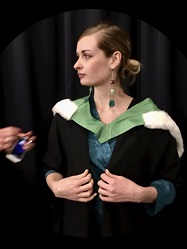For over 25 years, dolphin-assisted therapy (DAT) has been used as an AAT for individuals with mental and physical disabilities. The suggested benefits include increased motivation, attention span and language skills, as well as a reduction in social withdrawal. Whilst appearing beneficial, DAT research flags serious methodological flaws and an abundance of welfare concerns for both humans and dolphins. This lecture will start by exploring and critiquing DAT research, before introducing an exciting and innovative alternative – dolphin virtual-reality. Dolphin virtual-reality is a form of water-proof technology which enables people to feel as if they are swimming with wild dolphins, in an aquatic environment, without the use of real dolphins. A study exploring the potential benefits of dolphin virtual-reality for adults with additional needs, and its results, will then be presented and discussed.
Speaker: Georgia Smith BSc MSc

Georgia is currently working as an Assistant Psychologist for NHS Grampian’s Learning Disability Service. She completed her BSc Psychology at Canterbury Christ Church University – where she first developed an interest in human-relationships and conducted a research project exploring child-pet relationships in children with Autism Spectrum Condition. She then worked as a Behavioural Therapy Assistant with children and adolescents whose behaviour is perceived as challenging, before moving to Scotland to complete her masters in Human Animal Interaction. Georgia aims to complete the doctorate in Clinical Psychology, whilst continuing to utilise, promote and protect the human animal bond.
